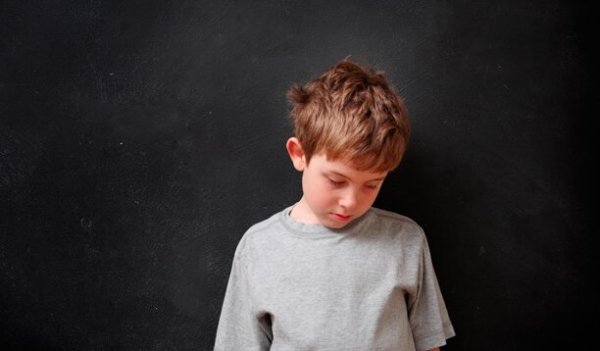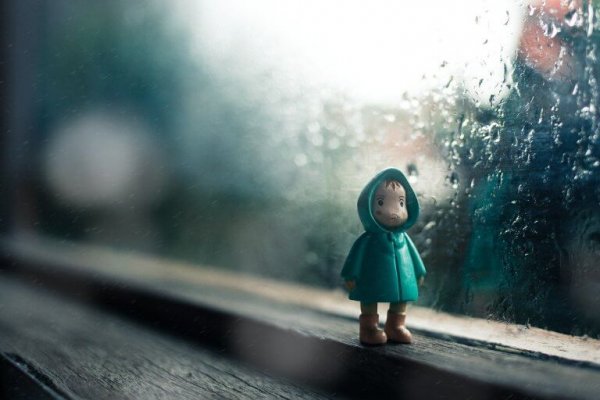What Happens in the Heart of an Unloved Child

No parent will admit they don’t love their child. But it happens more often than it should.
Just by looking at an unloved child sometimes we can immediately detect the scars. The difference between a child who’s loved and accepted and one who isn’t is awful.
There are many reasons a parent may not give love to their child. One of the biggest is if the decision to have children wasn’t a conscious or well-reasoned desire. There was no space in their heart for that child, and it was impossible to make any.
When a child is a product of a lack of affection, they develop behaviors and expressions that manifest their pain and unease.
The child doesn’t understand what’s happening to them, especially if they’re very small. An unloved child sees the world as a threatening place, like they’re all alone. They would do anything to make it change.
The situation gets more complicated when the parents refuse to admit it’s true. In these cases, they create a whole series of rationalizations to justify their lack of affection or abuse.
Basically, they say that each aggression, or the indifference, is for the child’s own good. So the child ends up confused and thinking it’s them who’s doing something wrong.
“It’s never too late to have a happy childhood.”
-Tom Robbins-

Blame and the Unloved Child
Say there’s a mother who tells her child they exasperate her. Or that she “can’t handle them.”
Obviously a lot of mothers who say this are just having a bad day. Maybe they were dealing with extreme stress before the incident with the child.
But other times a parent puts demands on the child that they aren’t able to fulfill. Whether because there are too many expectations, they’re poorly explained, or take more skills than the child has at their developmental stage.
It might be that they’re always quiet, paying attention for long periods of time, or setting the table with the skill of an adult.
In these cases it’s the parents themselves, with their lack of vision, who create their own frustration. And, what’s worse, they’re the ones who make the child feel frustrated and incompetent.
An unloved child sees almost everything they do as annoying to their parents. And that nothing is enough to get their parents to finally accept them.
Since they have no way to objectively evaluate the situation, strong feelings of blame develop because of all this. They’ll create a negative self-image and develop learned defenselessness.
They have the feeling that no matter what they do the outcome is always the same, and because of that, it’s uncontrollable.

Hints of an Unloved Child
When a child is unloved, their heart breaks. Because they’re not able to give a shape or reason to their suffering, they manifest it indirectly. They develop behaviors or ideas whose function is to let out the anxiety and pain living inside them.
Some of the actions that reveal a lack of affection in a child are:
- They develop fears and phobias. Of the dark, certain objects or animals, certain situations. The child can’t control them.
- They become very impulsive. They can’t contain their rage, their tears or laughter, any emotions. Their emotional expressions will always have an exaggerated tone.
- They’re unstable. They want one thing today and another thing the next. The child may also change their behavior from one moment to the next. That’s normal for children, but this quality is more pronounced in an unloved child.
- They develop anxious behaviors. Like not being able to stay still, asking questions all the time, or any other kind of repetitive behavior.
- It’s hard for them to concentrate or pay attention. They tend to have problems in school.
- They become invisible or try to. While the child may be there, it’s like they’re not. They’ll try to hide, sneak away, “not exist.”
- An unloved child doesn’t have many social skills. They feel very uncomfortable or behave very badly when with other children or adults.
An unloved child becomes very suspicious. They show a lot of signs of confusion and discomfort. Sometimes they’re really stubborn, and others, extremely lifeless for their age. In general, we see them as sad, submissive, and desperate for support.

Human beings need touch, hugs, and warm words throughout our whole lives. Especially in our early years. These signs of affection are the emotional “food” we need to grow.
They’re a basic need, just like eating or sleeping. No parent is perfect, but once they have a child, no matter what, they have to work to make sure the child feels loved and welcomed into the family.
No parent will admit they don’t love their child. But it happens more often than it should.
Just by looking at an unloved child sometimes we can immediately detect the scars. The difference between a child who’s loved and accepted and one who isn’t is awful.
There are many reasons a parent may not give love to their child. One of the biggest is if the decision to have children wasn’t a conscious or well-reasoned desire. There was no space in their heart for that child, and it was impossible to make any.
When a child is a product of a lack of affection, they develop behaviors and expressions that manifest their pain and unease.
The child doesn’t understand what’s happening to them, especially if they’re very small. An unloved child sees the world as a threatening place, like they’re all alone. They would do anything to make it change.
The situation gets more complicated when the parents refuse to admit it’s true. In these cases, they create a whole series of rationalizations to justify their lack of affection or abuse.
Basically, they say that each aggression, or the indifference, is for the child’s own good. So the child ends up confused and thinking it’s them who’s doing something wrong.
“It’s never too late to have a happy childhood.”
-Tom Robbins-

Blame and the Unloved Child
Say there’s a mother who tells her child they exasperate her. Or that she “can’t handle them.”
Obviously a lot of mothers who say this are just having a bad day. Maybe they were dealing with extreme stress before the incident with the child.
But other times a parent puts demands on the child that they aren’t able to fulfill. Whether because there are too many expectations, they’re poorly explained, or take more skills than the child has at their developmental stage.
It might be that they’re always quiet, paying attention for long periods of time, or setting the table with the skill of an adult.
In these cases it’s the parents themselves, with their lack of vision, who create their own frustration. And, what’s worse, they’re the ones who make the child feel frustrated and incompetent.
An unloved child sees almost everything they do as annoying to their parents. And that nothing is enough to get their parents to finally accept them.
Since they have no way to objectively evaluate the situation, strong feelings of blame develop because of all this. They’ll create a negative self-image and develop learned defenselessness.
They have the feeling that no matter what they do the outcome is always the same, and because of that, it’s uncontrollable.

Hints of an Unloved Child
When a child is unloved, their heart breaks. Because they’re not able to give a shape or reason to their suffering, they manifest it indirectly. They develop behaviors or ideas whose function is to let out the anxiety and pain living inside them.
Some of the actions that reveal a lack of affection in a child are:
- They develop fears and phobias. Of the dark, certain objects or animals, certain situations. The child can’t control them.
- They become very impulsive. They can’t contain their rage, their tears or laughter, any emotions. Their emotional expressions will always have an exaggerated tone.
- They’re unstable. They want one thing today and another thing the next. The child may also change their behavior from one moment to the next. That’s normal for children, but this quality is more pronounced in an unloved child.
- They develop anxious behaviors. Like not being able to stay still, asking questions all the time, or any other kind of repetitive behavior.
- It’s hard for them to concentrate or pay attention. They tend to have problems in school.
- They become invisible or try to. While the child may be there, it’s like they’re not. They’ll try to hide, sneak away, “not exist.”
- An unloved child doesn’t have many social skills. They feel very uncomfortable or behave very badly when with other children or adults.
An unloved child becomes very suspicious. They show a lot of signs of confusion and discomfort. Sometimes they’re really stubborn, and others, extremely lifeless for their age. In general, we see them as sad, submissive, and desperate for support.

Human beings need touch, hugs, and warm words throughout our whole lives. Especially in our early years. These signs of affection are the emotional “food” we need to grow.
They’re a basic need, just like eating or sleeping. No parent is perfect, but once they have a child, no matter what, they have to work to make sure the child feels loved and welcomed into the family.
This text is provided for informational purposes only and does not replace consultation with a professional. If in doubt, consult your specialist.







